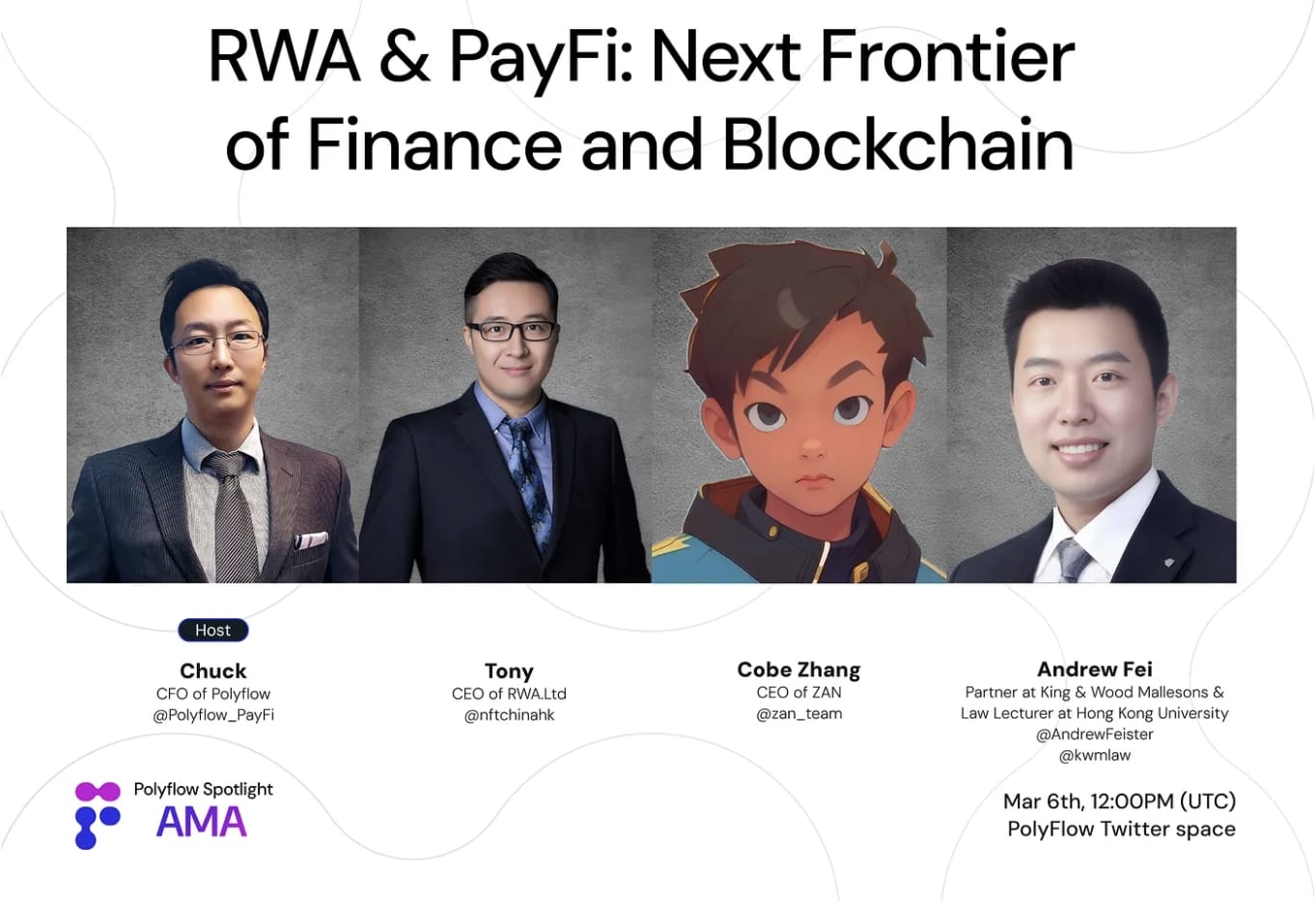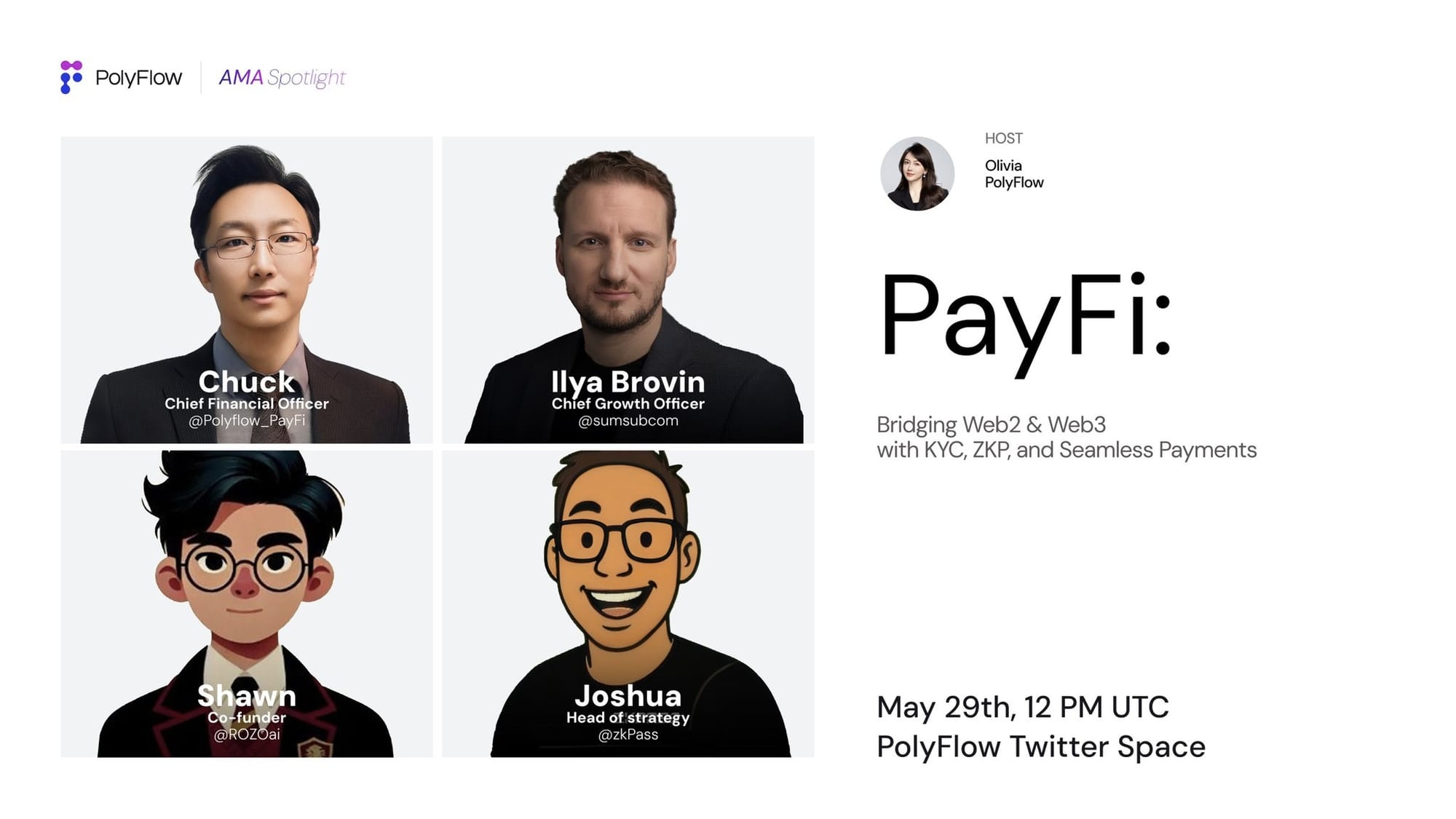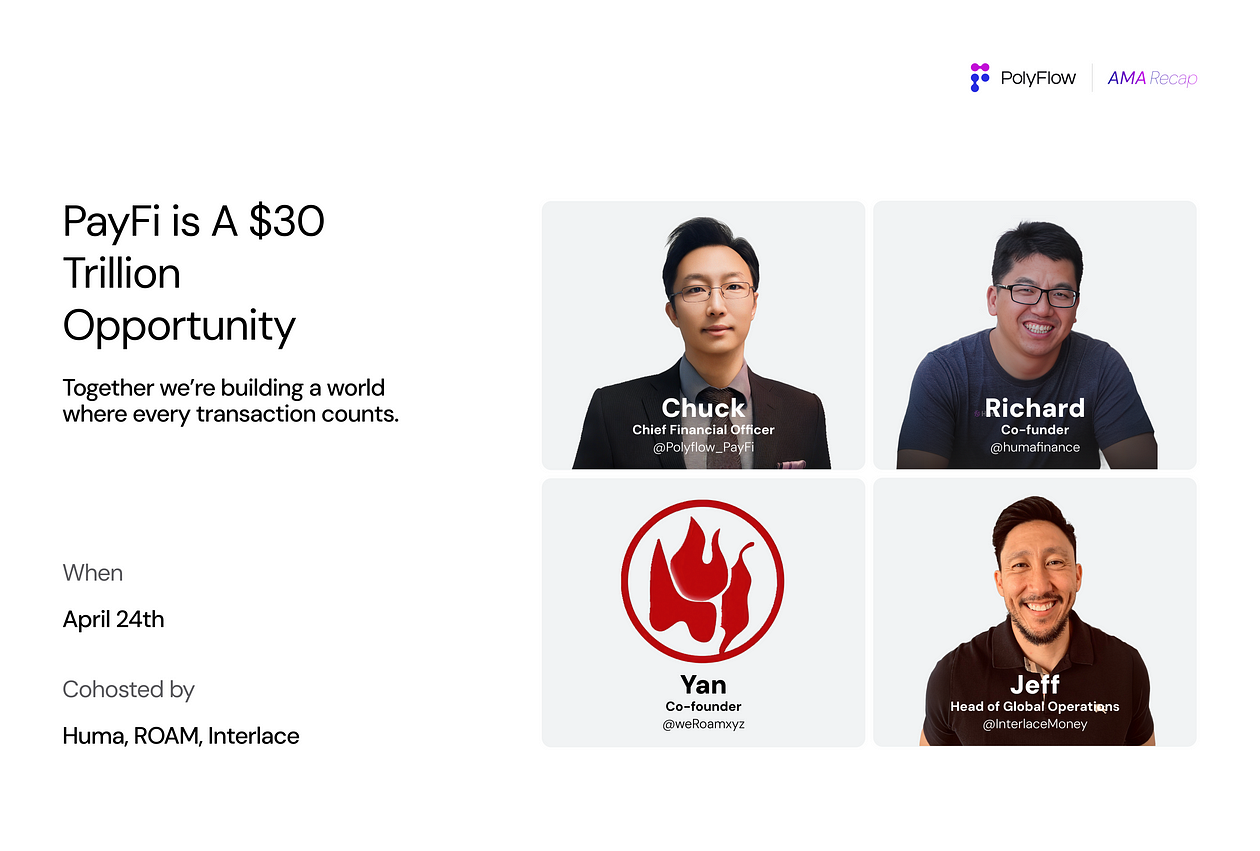PolyFlow AMA PayFi Spotlight | The Future of RWA Tokenization
The PolyFlow team recently hosted an insightful AMA featuring top experts in the Real-World Asset (RWA) tokenization space. Moderated by Chuck, CFO of PolyFlow, the discussion delved into the evolving RWA landscape, regulatory challenges, and the potential for mass adoption. The panel included: * Daisy — RWA Solution Architect at Zan, specializing in enabling Web3 projects through tokenized real-world assets. * Tony — Co-founder of RWA Ltd (formerly NFT China), a leading NFT trading platform

The PolyFlow team recently hosted an insightful AMA featuring top experts in the Real-World Asset (RWA) tokenization space. Moderated by Chuck, CFO of PolyFlow, the discussion delved into the evolving RWA landscape, regulatory challenges, and the potential for mass adoption. The panel included:
- Daisy — RWA Solution Architect at Zan, specializing in enabling Web3 projects through tokenized real-world assets.
- Tony — Co-founder of RWA Ltd (formerly NFT China), a leading NFT trading platform in Asia, focused on compliant Web3 infrastructure.
- Andrew — Partner at King & Wood Mallesons and law lecturer at Hong Kong University, specializing in crypto regulatory frameworks.
Defining RWAs and Their Market Impact
The discussion began with a broad overview of RWAs. Daisy explained that the concept encompasses both tokenized financial products, like bonds and stocks, as well as alternative assets such as real estate and commodities. She emphasized how tokenization provides Web2 enterprises a seamless entry into Web3, unlocking liquidity for traditionally illiquid assets.
Tony reinforced this view, describing RWA tokenization as a means of transforming tangible assets — such as intellectual property and supply chain goods — into blockchain-native instruments while maintaining regulatory compliance. He highlighted BYD’s eWay battery data tokenization as a prime example of how real-world businesses are leveraging blockchain to improve efficiency.
From a legal perspective, Andrew noted that RWA tokenization enables investors to access previously inaccessible assets while ensuring compliance with regulatory frameworks. He pointed out that institutional adoption of tokenized securities is growing as firms seek innovative financing models. “Tokenization of RWAs unlocks value by allowing investors to access underlying real-world assets through blockchain without moving the actual physical assets,” he explained.
Live Use Cases: Real-World Adoption of RWA Tokenization
Zan’s Green Energy RWAs
Zan has successfully launched two tokenized projects in renewable energy: EV charging stations and solar panel receivables. These assets generate steady cash flows but traditionally struggle to obtain financing due to their distributed nature. Tokenization allows investors to access these assets efficiently, providing a new financing paradigm for sustainable energy. Daisy stressed that “Green assets, like EV charging stations and solar panels, are a perfect fit for tokenization because they generate sustainable cash flows but struggle to secure financing through traditional banking.”
RWA Ltd’s Supply Chain Tokenization with BYD
Tony described how RWA Ltd has pioneered supply chain tokenization in BYD’s manufacturing ecosystem. By tokenizing industrial robots, RWA Ltd has created a leasing model where factories pay for automation over time, unlocking liquidity while ensuring operational efficiency. “In the BYD supply chain case, we’re tokenizing industrial robots used in manufacturing. Factories lease these robots, and through tokenization, we unlock liquidity for them while ensuring operational efficiency,” he shared.
Institutional Tokenization: Standard Chartered’s Money Market Fund
Andrew highlighted a major institutional initiative: Standard Chartered’s first tokenized retail money market fund in Asia. This project showcases the rising demand for tokenized securities, providing Web3 investors with a stable, yield-bearing asset that integrates seamlessly with blockchain infrastructure.
Regulatory Challenges & Cross-Border Compliance
With tokenization spanning multiple jurisdictions, regulatory compliance remains a major hurdle. Andrew explained that in Hong Kong, tokenized securities are treated the same as traditional financial instruments, ensuring clarity for market participants. He emphasized that “Regulators are beginning to differentiate between pure crypto assets and tokenized securities. With the right structure, tokenized RWAs can fit within existing financial regulations.”
Daisy underscored the importance of engaging regulators proactively and forming local partnerships to navigate different jurisdictions. Ensuring that tokens truly represent the ownership of real-world assets is essential for maintaining compliance and industry trust.
Mass Adoption: Ensuring a Liquid and Inclusive RWA Market
For RWA tokenization to achieve mainstream adoption, broader liquidity and inclusivity are necessary. Two key factors identified during the discussion were:
- User-Friendly Platforms & Fractional Ownership — Simplified interfaces and tokenized yield-bearing products can bridge the gap for retail investors, lowering entry barriers.
- Investor Education & Transparency — Many participants are still unfamiliar with RWAs. Comprehensive education and verified token issuance structures are crucial for trust and adoption.
Daisy pointed out that “We need user-friendly platforms that integrate familiar Web3 models like yield-bearing tokens and RWA vaults. Lowering the entry barrier is key to mass adoption.”
Key Risks & Safeguards
While RWA tokenization enhances liquidity, it also introduces potential risks:
- Market Manipulation & Institutional Control — Andrew emphasized that proper legal oversight, regulatory safeguards, and robust smart contract mechanisms can mitigate these risks.
- Lack of Underlying Asset Verification — Daisy warned that some RWA tokens do not actually represent true ownership of real-world assets, underscoring the need for due diligence in verifying projects.
- Liquidity Constraints — Tony acknowledged that ensuring liquidity remains a significant challenge, requiring strong investor networks and trust-building initiatives. “One of the biggest challenges is liquidity. It’s not just about tokenizing assets, but about finding investors and creating a viable marketplace where these assets can actually trade,” he pointed out.
Final Thoughts: The Future of RWA Tokenization
As RWAs continue to bridge traditional finance and Web3, the panelists agreed that regulatory clarity, robust infrastructure, and institutional adoption are critical for long-term success. Projects like Zan’s green asset tokenization, RWA Ltd’s supply chain finance models, and Standard Chartered’s money market tokenization are paving the way for a more transparent and accessible digital asset economy.
For builders and investors interested in exploring RWA integration, PolyFlow invites collaboration with its decentralized payment infrastructure designed to simplify compliance and unlock real-world utility in Web3 finance.
Follow us @PolyFlow_PayFi and stay ahead in the RWA revolution!
SOCIAL
To find out more about PolyFlow and keep up with our latest developments, follow the official channels.
📣Mirror | 💬 Global Community | 👾 Discord| 🐦 Twitter/X | 🌐 Website
CONTACT US
support@polyflow.tech

PolyFlow AMA: PayFi, Privacy, and the Path Forward
Recap: https://x.com/i/spaces/1vOxwXNNjqdKB/peek Participants: Joshua (ZKPass), Ilya (Sumsub), Shawn (Rozo Labs), Chuck (PolyFlow) Host: Olivia (PolyFlow) In this edition of PolyFlow’s PayFi Spotlight, top minds from identity, payments, and privacy infrastructure gathered to explore one of Web3’s most urgent frontiers: how to build compliant, user-friendly payment rails that connect Web2 and Web3 without compromising privacy or user experience. Hosted by Olivia in NYC, the conversation delve

PolyFlow AMA: PayFi’s Global Rise with Huma, ROAM, and Interlace
On April 24, 2025, the PolyFlow community came together for a landmark AMA featuring pioneers in the PayFi ecosystem. Hosted by Chuck Zhang, CFO of PolyFlow, the session spotlighted how real-world payment innovation is unfolding across decentralized networks, telecommunications, and cross-border finance. Meet the Speakers * Dr. Richard Liu — Co-Founder of Huma, building infrastructure for global payment financing via blockchain. * Dr. Yan Zhang — Founder of ROAM, a decentralized global telc

PolyFlow AMA PayFi Spotlight | The Future of RWA Tokenization
The PolyFlow team recently hosted an insightful AMA featuring top experts in the Real-World Asset (RWA) tokenization space. Moderated by Chuck, CFO of PolyFlow, the discussion delved into the evolving RWA landscape, regulatory challenges, and the potential for mass adoption. The panel included: * Daisy — RWA Solution Architect at Zan, specializing in enabling Web3 projects through tokenized real-world assets. * Tony — Co-founder of RWA Ltd (formerly NFT China), a leading NFT trading platform